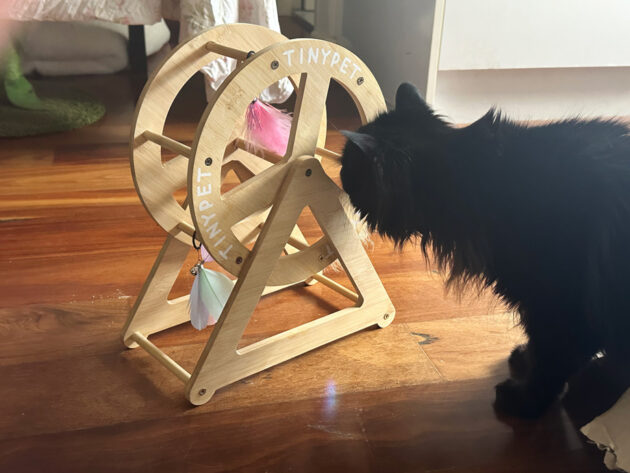Recently, I bought my cat a wooden carousel toy. When it arrived, I was concerned by the fact that the box was skinny. Too skinny. The type of skinny that made me suspect it might be a flat pack.
I opened the box and, well, let’s just say I’m not proud of the language I used.
Because yep, it was a f… lat pack.
But I’m an adult so I took my usual mature approach to such challenges – specifically, I made myself a cup of tea and stared at the thing. After waiting 45 minutes for a young Keanu Reeves type to crash through the door and save me from my misery, I reluctantly rolled up my sleeves and got to work.
Half a day later – yes, HALF A DAY LATER – I had built the cat carousel. The wooden columns came in two different lengths (a fun feature that wasn’t mentioned in the instructions), which led to multiple rebuilds and, I’m not ashamed to admit, tears.

A few months after this debacle, I resolved that what my cat needed next was a cat tree. And not just any cat tree – a mighty 2-metre-tall superstructure of a cat tree! This would surely be the most brilliant purchase decision I had ever made.
The box arrived. It was tall and skinny.
For feline’s sake!
What had I done? Blinded by love for my cat, and having seemingly learnt nothing from my previous trauma, I was again lumped with a DIY project and an Allen key. I’m not a parent, but I can only assume this is what it must be like to have your second child.
All of which brings me (a little circuitously) to the topic of medical writing.
You see, medical writing is a specialised task. Asking a writer without healthcare expertise to do it is like building a cat tree with an Allen key – sure, you could, but it’s probably going to end in tears.
It’s a fair question, and one that most of us have been asked at some stage by our mystified relatives and friends.
As I alluded to earlier, medical writing is a niche area. So unless you work in the field, it’s not obvious what medical writers actually do and how they can help you. In my case, as a relatively recent inductee into the medical writing community, this has led to some frustrating conversations with relatives – which usually end with backhanded platitudes like ‘so long as it makes you happy’ and ‘you do you’.
So, in case you’re also confused about what we do, let me explain.
First, it’s worth noting that medical writing is quite a broad term that can potentially encompass anything from healthcare journalism through to writing clinical trial protocols. But for this article, I’ll limit the discussion to medical writing for the purpose of marketing products or services (i.e. what we do here at Wellmark).
It’s pretty common for medical writers to have scientific qualifications, and potentially some kind of healthcare background. At Wellmark we even have writers with medical degrees (including yours truly!) and clinical experience of working as doctors – but admittedly this is unusual even among medical writers. After all, most people aren’t mad enough to change career after studying for that long (and even fewer are masochistic enough to then study postgraduate marketing as well, which our writers have also done).
But the beauty of all that training and experience – combined with writing skills, of course – is that medical writers have specialist expertise that can make your life a whole lot easier. This includes:
I did digress a bit there. So in case you’re wondering what happened with my deconstructed cat tree, that Keanu Reeves type never did show up. But fortunately my dad did – armed with a power tool. Take that, Allen key!
Without wanting to draw too long a bow, I’d say our writers are a bit like those click-on click-off multi-use power tools. With our collective wealth of experience in healthcare, writing and marketing, we can help build your brand with minimal hassle.
And that can potentially save you a lot of time, trauma and tears. So power up!
To learn more about what Wellmark’s medical writers can do for you, check out our repertoire.
